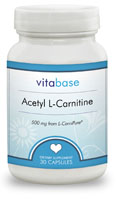| Carnitine helps transport fatty acids to the powerhouse of the cell. Fatty acids are the main fuel source for heart and skeletal muscle. Long-chain fatty acids require l-carnitine to transport them across the inner membranes of the mitochondria, wherein their metabolism produces bioenergy. L-carnitine can remove short-chain and medium-chain fatty acids from the mitochondria
in order to maintain coenzyme A levels in these organelles. L-Carnitine also facilitates the metabolism of carbohydrates and enhances the rate of oxidative phosphorylation. L-Carnitine works synergistically with CO-Q10, an antioxidant and energy co-factor that is found in the inner membrane of the mitochondria.
Carnitine plays a critical role in metabolizing a number of other important substances as well, which helps to explain why it holds promise for so many disorders. Carnitine mediates the transport of medium/long-chain fatty acids across mitochondrial membranes, facilitating their oxidation with subsequent energy production. Carnitine may have neuroprotective effects. This means that the strong antioxidant properties of acetyl-L-carnitine may help to prevent oxidative damage to nerve cells that are important for brain functioning.
The strongest evidence for the use of supplemental L-carnitine may be in the management of cardiac ischemia and peripheral arterial disease. It may also more generally be indicated for cardioprotection. It lowers triglyceride levels and increases levels of HDL-cholesterol in some. It is used with some benefit in those with primary and secondary carnitine deficiency syndromes. There is less evidence to support arguments that carnitine is indicated in liver, kidney and immune disorders or in diabetes and Alzheimer's disease.
Carnitine is used for a small percentage of people who are at risk of liver damage from AEDs and is used for children with multiple seizure types who are taking multiple AEDs. Carnitine is used in emergency situations where there is liver damage caused by valproate, or in cases of valproate overdose. It is used in rare diseases involving problems of the transport of carnitine into the mitochondria.
L-carnitine has been marketed as a weight loss supplement, because the primary function of carnitine in human cells is to burn fat as a source of energy. Carnitine supplementation may actually help increase energy, burn fat more efficiently and may improve heart and liver health all at the same time.
Carnitine is recommended as a daily supplement to help maintain blood lipid profile and promote fatty acid utilization within heart muscle. People who take l-carnitine supplements soon after suffering a heart attack may be less likely to suffer a subsequent heart attack, die of heart disease, experience chest pain and abnormal heart rhythms, or develop congestive heart failure. Some studies have shown Carnitine may reduce the pain and complications of lack of oxygen to the heart and improve exercise tolerance in people with existing heart disease.
The function of carnitine is to help the body use stored fat as fuel. Carnitine is helpful for improving exercise performance. Supplementation with carnitine has been said to enhance lipid oxidation, increase VO2max and decrease the accumulation of lactic acid during exercise.
Carnitine reduces the incidence of angina and cardiac arrythmias as well as reduces the need for anti-angina and anti-arrythmic medications.
Acetyl-L-carnitine may be indicated for use in cases of mild Alzheimer's disease, dementia, Down's syndrome, recovery from stroke and for the management of various neuropathies.
| 